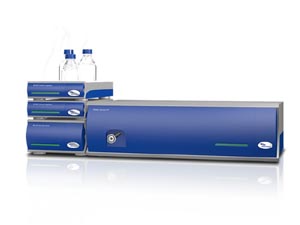September 2018

Case study using TFFF
Postnova Analytics reports on how Thermal Field Flow Fractionation has been successfully used to elucidate the core microstructure, morphology and chain arrangement of self-assembling block copolymers.
This pioneering study was undertaken by the renowned research group under Professor H Pasch at the Department of Chemistry and Polymer Science, University of Stellenbosch (South Africa).
“Thermal FFF data has proved invaluable in advancing our research”, commented Professor Pasch “. He added “It allows us to separate and understand polymer species that we otherwise would not be able to, adding a new dimension to our analytical capability.”
Thermal Field-Flow Fractionation (TFFF)
is a technique which is ideally suited for the characterization of polymers, gels and nanoparticles using different organic solvents and to get additional chemical information about the polymers. Different from the other Field-Flow Fractionation sub-techniques, Thermal Field-Flow Fractionation can separate polymers not only by molar mass but also by chemical composition at the same time. Thus, Thermal Field-Flow Fractionation can separate two polymer fractions of different material but same molecular weight into independent peaks.
The self-assembly of block copolymers (BCPs),
as a result of solvent selectivity for one block, has recently received significant attention due to novel applications of BCPs in pharmaceuticals, biomedicine, cosmetics, electronics and nanotechnology.
The correlation of BCP microstructure and the structure of the resulting self-assemblies requires advanced analytical methods. However, traditional bulk characterization techniques are limited in the quest to provide detailed information regarding molar mass (Mw), hydrodynamic size (Dh), chemical composition, and morphology for these self-assemblies.
In the new study,
thermal field-flow fractionation (ThFFF) was used to investigate the impact of core microstructure on the resultant solution properties of vesicles prepared from polystyrene-polybutadiene block copolymers (PS-b-PBd) with 1.2- and 1.4-polybutadiene blocks, respectively.
The researchers at the University of Stellenbosch were able to successfully separate, using ThFFF, micelles prepared from BCPs of similar PS and PBd block sizes. Furthermore, it was established that for the vesicles and homopolymers of similar surface chemistry and Dh, ThFFF was sensitive towards the inherent differences in morphology and chain arrangement, enabling the two polymeric species to be successfully separated.
The measurements for this research study
were performed using a Postnova Analytics TF2000 thermal field-flow fractionation system coupled in series to MALS and RI detectors as well as a Malvern Instruments Zetasizer Nano system.
To request a copy
of University of Stellenbosch research study or further information on the TF2000 thermal field-flow fractionation system please contact Postnova Analytics on +49-8191-985-6880 / +44-1885-475007 / +1-801-521-2004 / info@postnova.com.
Postnova Analytics
Founded in 1997, Postnova Analytics is the inventor and leading international supplier of Field-Flow Fractionation (FFF) systems for markets including biopharmaceuticals, polymers, materials, nanotechnology and environmental sciences. Leveraging its unique and patented modular FFF - Light Scattering Platform, Postnova has been able to provide high performance solutions to a wide range of applications. Today the company's growing product portfolio includes Flow FFF, Centrifugal FFF, Thermal FFF, Size Exclusion Chromatography (SEC), MALS and DLS Light Scattering. Postnova (www.postnova.com) is located and headquartered in Landsberg am Lech (Germany) and has subsidiaries in the USA, UK and Finland. These offices in conjunction with a highly qualified and trained distribution network provides informed local support to customers worldwide.
Worldwide HQ
Postnova Analytics GmbH
Max-Planck-Straße 14
86899 Landsberg am Lech
Germany
Tel: +49-8191-985-6880
Email: info@postnova.com
Web www.postnova.com
UK
Postnova Analytics UK Ltd.
Unit 56, The Hop Store
Bishops Frome
WR6 5BT
UK
Tel: +44-1885-475007
Email: info.uk@postnova.com
Web www.postnova.com |